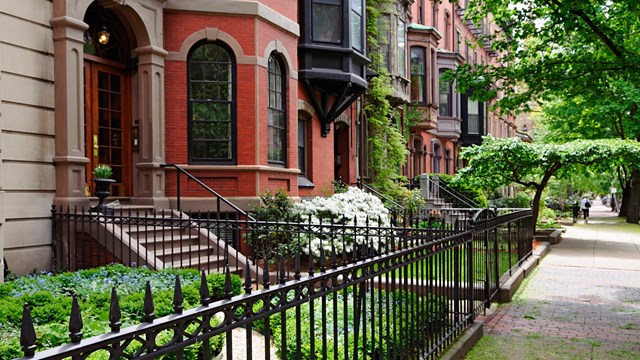With the end of winter comes relief—gone are the grey skies and slush-puddles, and the promise of balmy days and sunshine is in the air. But the board of a condo, cooperative, or homeowners association cannot be content with simply waiting for April showers to bring the long-awaited May flowers. Amenities don’t maintain themselves, and neither does landscaping, pavement, or any of the host of other elements a board of trustees has to keep tabs on. The board that waits until the last minute to line up its vendors or survey its property to ascertain what work needs to be done can find itself in a tight spot as contractors are booked and unit owners grow increasingly antsy to get outdoors and enjoy their community’s amenities and features.
Vendor Vacancies
No matter the size or demographic of your community or building, most pros recommend getting a head start on springtime projects and maintenance around the beginning of the new year—and that includes connecting with the vendors and contractors involved well before snow is out of the question. This gives your association a leg up on securing quality work at a fair price.
“We start shopping for vendors in January or February, when the bidding is a little less competitive,” says Randy Rosen, president of Rosen Management Services in Chicago, Illinois. “This applies to pool management companies, landscapers, and the like. Specifications need to be drawn first, and those can either be done by a property manager or an outside consultant. We need to anticipate how many cuts we’re going to need during the season, whether the vendor will handle aerating, seeding, weed control; will they turn over the ground and the flower beds? Are they going to do seasonal plantings? We take a look at the budget and review what we did the year prior to determine what needs be done now.”
Ed Hofeller, president of The Hofeller Company in Brookline, Massachusetts, advises boards to seek scheduling flexibility from vendors, when possible. “A lot of vendors have set start dates, but spring is coming earlier and earlier each year,” he says. “I think that we’re currently three weeks ahead of when spring historically started. You need flexibility in agreements with vendors, so that if you call them and say, ‘We need to get started earlier,’ you’re not going to run into push-back because a contract’s specifications get in the way.”
And Scott Dalley, executive vice president and chief operating officer of Access Property Management in Flemington, New Jersey, suggests that boards start preparing for the upcoming season six months in advance. “If you wait until springtime to engage with landscaping vendors, or to consider an improvement project on your grounds, then you will be way behind the eight ball,” he says. “You can sacrifice both value and quality of work. For a big planting project, for example, you may want to be starting a year in advance, as you may want to get materials in the ground, depending on the nature of the work. A landscaping project undertaken in the fall can literally bear fruit, or at least the desired effect of your planning, when the spring arrives.”
A Pool and a Pond
As water usually freezes over during the winter, an association can be forgiven for letting their on-site pool or pond drift far from their thoughts during chillier months. But as soon as it gets warm out, owners are going to be hankering for these amenities, whether that means having the pond sparkling and pristine, or the pool open for cooling off.
“Boards occasionally overlook pond maintenance, or fail to properly aerate around one,” notes Rosen. “Another issue is bird control—primarily geese wandering around and leaving ‘presents’ on the lawn. There are companies that will police and get rid of ill-behaved birds. Sometimes they will have dogs come and actually chase them away. And it works; the birds don’t come back, at least for a while—although sometimes they’re not smart enough to stay gone.”
In New Jersey, says Dalley, a board must employ a certified pool operator to handle various aquatic business. “When you’re closing an outdoor pool after Labor Day, it’s important to not only put the cover on the pool to prepare for winter, but to do an evaluation of the pool’s systems—the pumps and the assorted lines connected thereto—because, if you need to have work done, or you need to have the pool resurfaced, you’ll want to schedule that so it’s on the pool operator’s agenda for as soon as weather permits,” he says. “The pool season is limited—it typically extends from Memorial Day to Labor Day—and you want your residents to enjoy their amenity. If you have pool maintenance going on halfway into June or until the end of that month, you’re going to have some unhappy homeowners wondering why you scheduled maintenance so far into the operating season.”
And this extends from actual pool maintenance to aesthetic concerns in and around the pool area. Everything should be handled well in advance. “When you go to your vendors, you want them to do a lot of preventive maintenance, a lot of that pre-check very early on, so anything that’s found as a problem can be resolved before the season actually starts,” says Hofeller. “You’d be surprised how often people are saying, ‘We should put a shrub next to the pool!’ come June. By then, the heat is rolling in, and it’s not a time to plant shrubbery.”
Little Wimbledon
Some associations, especially those outside of the big cities, where space is more readily available, go big on amenities, installing play areas, or even tennis courts. In order to have these up and running come spring, associations need to (all together now): Start Planning Early.
“In the fall, when tennis season has come to an end, the court should be inspected,” says Rosen. “When the snow starts to melt in late winter, you go over it again, to best ascertain what deterioration may have befallen the amenity during the winter; like whether the asphalt or the surface has held up.”
If a board can have an idea in the fall of what work will need be done prior to re-opening the court the next spring, it can and should schedule that as soon as possible. “If you’re going to do something like resurfacing a tennis court, your window of opportunity is certainly limited, as that is a weather-sensitive project,” says Dalley. “You want to schedule that repair as soon as you can, as people are going to want to play as soon as the weather turns. You need to act as soon as the constant temperature allows you to put down a new surface, so as not to impede play. If you can do it late in the fall, so much the better—but if you have to do it in the spring, you want to make sure that you’re on the vendor’s calendar so they can do it right away and you maximize the value to your homeowners.”
As with pools, landscaping needs surrounding a tennis court must be realized as well. “A lot of people arrive at the idea to do something which has a shorter season than they acknowledge,” says Hofeller, “like planting trees, for example, when the window to do so is already closing. If you don’t put the plants and shrubbery in the ground until, say, the first week of April, and you wait to make that call until your contract with a vendor has already started, you’re not going to be able to get those plants in the ground until after the optimal time.”
Weather the Storm
One of the most frustrating variables when planning for spring, as was briefly touched upon above, is the weather; it has always been quite hard to predict, and it seems to only be getting more difficult as climate change continues to impact temperatures and weather patterns.
“These days, property managers have to be amateur meteorologists,” laments Hofeller. “But although various weather forecasting services may not always agree, a lot of them are reliably consistent when it comes to long-term trends, and you can fairly safely plan around those predictions. Property managers today have to integrate that ability into their other skill sets, so that they can make adjustments to launch dates when the weather demands it.”
Dalley points to the fact that last spring, the Northeast was still seeing significant snowfall in mid-March. “If you’re snow-covered at the beginning of March, it may well slow down any work you can do on the grounds, since they must be clear of ice and snow before a landscaper can come in and prepare for the coming season,” he says. “The first thing they’re going to do is sweep the grounds, pick up dead branches, edge the beds, and as soon as the soil temperature reaches a certain level, they put down a pre-emergent which retards weeds. A lot of this is weather dependent, but we hit the ground running, certainly, by the end of March, in anticipation of the coming season.”
The mantra of spring prep—or really, any seasonal planning for your building or community—is, of course, Plan Ahead. The more lead time you allow yourself and your contractors and vendors, the more likely you’ll be to get a great result at a price that doesn’t raise your blood pressure.
Cooper Smith is a staff writer and reporter for New England Condominium.










Leave a Comment